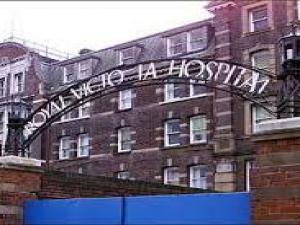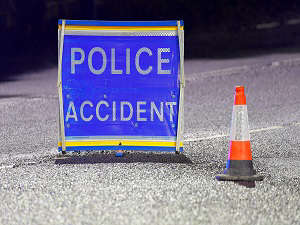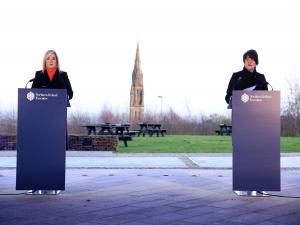
Part of the Royal Victoria Hospital's emergency department became "gridlocked" with patients on trolleys because of overcrowding, an inspection report said.
The dignity of the sick was infringed and it became harder for staff to provide basic nursing care and for surgeons to examine patients, the independent review said.
The increased number of patients attending and the acuteness of their conditions, a block on exits from the department and limited bed capacity contributed, according to the Regulation and Quality Improvement Authority (RQIA).
However, governance and leadership at the west Belfast hospital was strong and staff morale good at the building - which opened in summer last year.
The report said: "The number of patients on trolleys exceeded the number of designated assessment spaces, which caused the majors area to become quickly gridlocked with patients on trolleys, placed in very close proximity to one another, in and around the central work station.
"As a result, we observed an increase in patient anxiety as dignity and privacy became compromised and it became more challenging for staff to provide basic nursing care."
The unannounced inspection took place last December as part of the inspectorate's ongoing programme to provide assurance to the public about the quality of hospital services, and to contribute to improvements in the delivery of care.
Inspectors observed an afternoon escalation in activity within the emergency department which caused areas where the gravely ill were treated to become crowded.
The report said: "We observed that the number of patients occupying the majors area was beyond the capacity for which it was designed to manage at any one time.
"Medical staff raised concerns related to the assessment of patients in the majors area during times of crowding.
"The surgical team in particular highlighted that there was insufficient space to examine patients, no dedicated areas in which to move them for assessment and that privacy and dignity could not be maintained."
Inspectors observed reassessment of patients by senior clinicians in line with procedures and senior managers within the emergency department who were actively working to remove any obstacles to the flow of patients from the department.
Olive MacLeod, RQIA's chief executive, said governance and leadership were strong, and staff morale was good, with staff stating they felt supported by management.
She added: "However, inspectors considered that crowding was an issue, with an increase in patient numbers in the afternoon and evening, making it challenging for staff to provide nursing care and maintain the privacy and dignity of their patients."
A spokesman for the Belfast Trust, which runs the hospital, said the report recognised the tremendous strides made by staff to continually improve the safety of care provided, the way in which they cared for patients and how they managed the environment within which they were cared for.
He added: "As a learning organisation, we accept there are areas that would benefit from improvement.
"Immediately RQIA gave us verbal feedback at the time of the inspection regarding improvements, staff moved to put them in place and we are confident we will meet all the recommendations that are within the trust's control.
"There are other recommendations that may require further collaboration with other organisations.
"Belfast Trust is fully supportive of RQIA's inspection process and will continue to work with the regulator to improve and enhance patient safety and experience."


 Palestine flag flies on Belfast City Hall
Palestine flag flies on Belfast City Hall
 Man attacked in home by masked gang armed with hammer
Man attacked in home by masked gang armed with hammer
 Man and woman die in Co Antrim crash
Man and woman die in Co Antrim crash
 Divided Stormont led to ‘chaotic’ Covid response, public inquiry finds
Divided Stormont led to ‘chaotic’ Covid response, public inquiry finds